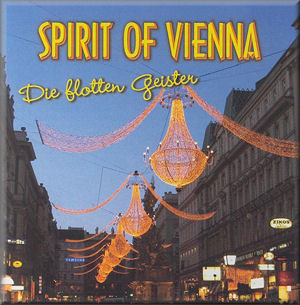 |
 |
|

Availability
CD: Johann
Strauss Society
|
Spirit of Vienna
Johann STRAUSS Jr (1825-1899)
Reiche Mädchen overture [8:33]; Fanny Elssler,
overture [9:25]
Johann STRAUSS III (1866-1939)
March, waltz, and polka from Katz und Maus [16:36]
Siegfried TRANSLATEUR (1875-1944)
Traumverloren, waltz [8:07]
Paul LINCKE (1866-1946)
Casanova march [2:44]; Casanova waltz [8:57]
Alfons CZIBULKA (1842-1894)
Von der Hochschule, polka-mazurka [4:27]
Edmund EYSLER (1874-1949)
Schützenliezel, waltz [8:14]
Richard EILENBERG (1848-1925)
J’y pense, gavotte [3:08]
Joseph HELLMESBERGER (1855-1907)
Veilchenmädel, waltz [9:19]
 Die flotten Geister/Christian Pollack Die flotten Geister/Christian Pollack
rec. 3-6 December, 2005, Brno, Czech Republic
 JOHANN STRAUSS SOCIETY JR0160-2 [79:35]
JOHANN STRAUSS SOCIETY JR0160-2 [79:35] 
|
|
|
This first volume of the Johann Strauss Society’s series
“Spirit of Vienna” opens with a bang. Oskar Stalla’s
overture to Reiche Mädchen, an arrangement
of pre-existing melodies by Johann Strauss, is a total
delight in the great Straussian tradition, with an imposing
introduction, a chipper conclusion and many teasing waltz segments
in between. It is followed by more music from the world of operetta:
three short pieces from Katz und Maus, by Johann Strauss
III (son of Johann II’s brother Eduard). Each certainly
lives up to the family name, although the march’s central
section bears an uncanny resemblance to John Philip Sousa’s
“Liberty Bell,” the signature tune of Monty Python.
Siegfried Translateur is an interestingly-named composer (perhaps
he missed his true calling?) whose Traumverloren waltz
opens with string tremolos that consciously evoke the famous
beginning of the Blue Danube. Alas, what follows is a
not particularly interesting waltz which grows old well before
it is over.
At the heart of the album, though, are two choice selections
by Paul Lincke, a prolific light-music composer who, according
to the liner notes of the Naxos album “Strike up the Band!,”
wrote over 500 pieces, some under the pseudonym Ted Huggens.
Why he should choose “Ted Huggens” is a bit of a
mystery to me; Lincke was a Berliner his whole life and his
march Berliner Luft (The Berlin Air) is still
a hometown favorite.
On this disc Lincke is represented by one march and one waltz,
each from the operetta Casanova. They are irresistible:
the march is speedy, enthusiastic, and full of good ideas; the
waltz is a real charmer, like Casanova himself, perhaps.
Joseph Hellmesberger’s waltz Veilchenmädel
is another highly accomplished waltz, with an impressive oboe
solo in the introduction, excellent orchestration throughout,
and a beguiling set of tunes; like Lincke’s work, deserving
of recognition alongside the best music of the time.
The rest of the album is mixed: a rather dull polka-mazur by
Alfons Czibulka, an instantly likeable but not-too-memorable
gavotte by Richard Eilenberg, the capable, cheery Schützenliezel
waltz by Edmund Eysler, who wrote an incredible 50 operettas,
and another overture of Johann Strauss tunes arranged by Oskar
Stalla, this one entitled Fanny Elssler and just as enjoyable
as the last, with maybe an even catchier collection of tunes.
Die flotten Geister (as Thomas Reinhart translates it for me,
“The Dashing Spirits,” or “The Elegant Spirits”)
is a relatively small group of musicians assembled for the purpose
of the Johann Strauss Society’s recordings. Technically
it is rather inferior, and the closeness of the acoustic highlights
the thinness of the string section (a single clarinet nearly
drowns out the violins in the Eysler waltz), but the players
have the requisite love for this music, and they play intent
on communicating that passion to us. Dashing spirits, indeed,
especially under the lively leadership of light music scholar
Christian Pollack.
I have approached this series backwards, beginning with a review
of Spirit of Vienna, Vol. II. Like that volume, this one has
its fair share of delights, along with a handful of works which
might deserve their obscurity. Like that volume, all the recordings
are world premieres. For admirers of Viennese light music, this
series makes for important, enjoyable listening.
Brian Reinhart
see also review by Raymond
Walker
|
|












